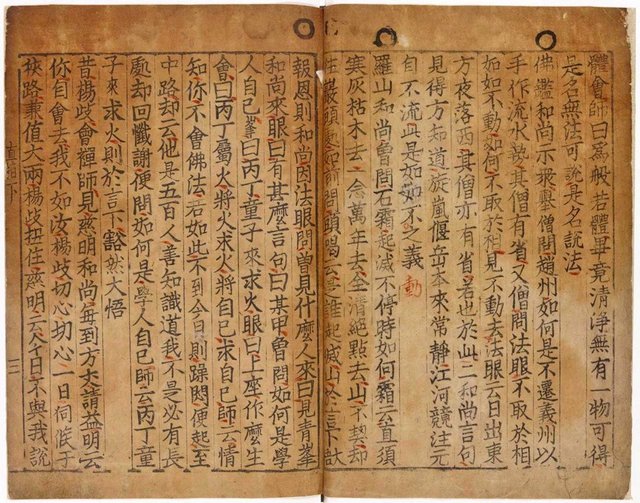
So, this just passed by on my RSS feed and jumpped out at me. Seems like Gutenberg wasn’t actually first at creating the printing press.
It is important to recognize what this means. The innovation that Johannes Gutenberg is said to have created was small metal pieces with raised backwards letters, arranged in a frame, coated with ink, and pressed to a piece of paper, which allowed books to be printed more quickly. But Choe Yun-ui did that — and he did it 150 years before Gutenberg was even born.
Gutenberg’s creation of the process did spread much faster. The Korean printing press was hampered by a number of factors.
Notably, Korea was under invasion, which hampered their ability to disseminate their innovation. In addition, Korean writing, then based closely on Chinese, used a large number of different characters, which made creating the metal pieces and assembling them into pages a slow process. Most importantly, Goryeo rulers intended most of its printing projects for the use of the nobility alone.
Very interesting story.
LINK: So, Gutenberg Didn’t Actually Invent the Printing Press
 |
David LaSpina is an American photographer lost in Japan, trying to capture the beauty of this country one photo at a time. More? |
The picture illustration looks Chinese to me.
Downvoting a post can decrease pending rewards and make it less visible. Common reasons:
Submit
It's a Zen Korean document. I don't know the details, but I believe Korean used to use Chinese characters. See: https://en.wikipedia.org/wiki/Jikji
Downvoting a post can decrease pending rewards and make it less visible. Common reasons:
Submit
Jikji
Jikji (Korean pronunciation: [tɕiktɕ͈i]) is the abbreviated title of a Korean Buddhist document, whose title can be translated "Anthology of Great Buddhist Priests' Zen Teachings". Printed during the Goryeo Dynasty in 1377, it is the world's oldest extant book printed with movable metal type. UNESCO confirmed Jikji as the world's oldest metalloid type in September 2001 and includes it in the Memory of the World Programme.Jikji was published in Heungdeok Temple in 1377, 78 years prior to Johannes Gutenberg's acclaimed "42-Line Bible" printed during the years 1452–1455. The greater part of the Jikji is now lost, and today only the last volume survives, and is kept at the Manuscrits Orientaux division of the National Library of France.
Downvoting a post can decrease pending rewards and make it less visible. Common reasons:
Submit
Hi, @dbooster!
You just got a 1.96% upvote from SteemPlus!
To get higher upvotes, earn more SteemPlus Points (SPP). On your Steemit wallet, check your SPP balance and click on "How to earn SPP?" to find out all the ways to earn.
If you're not using SteemPlus yet, please check our last posts in here to see the many ways in which SteemPlus can improve your Steem experience on Steemit and Busy.
Downvoting a post can decrease pending rewards and make it less visible. Common reasons:
Submit
Thank you so much for participating in the Partiko Delegation Plan Round 1! We really appreciate your support! As part of the delegation benefits, we just gave you a 3.00% upvote! Together, let’s change the world!
Downvoting a post can decrease pending rewards and make it less visible. Common reasons:
Submit
Hi @dbooster!
Your post was upvoted by @steem-ua, new Steem dApp, using UserAuthority for algorithmic post curation!
Your UA account score is currently 4.239 which ranks you at #2788 across all Steem accounts.
Your rank has dropped 7 places in the last three days (old rank 2781).
In our last Algorithmic Curation Round, consisting of 181 contributions, your post is ranked at #26.
Evaluation of your UA score:
Feel free to join our @steem-ua Discord server
Downvoting a post can decrease pending rewards and make it less visible. Common reasons:
Submit